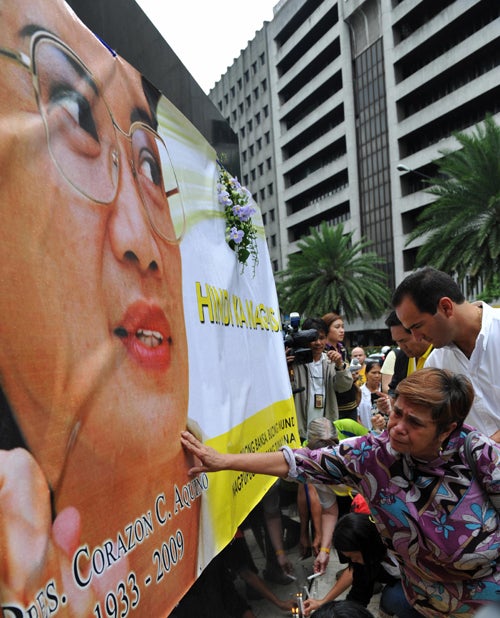Your support helps us to tell the story
From reproductive rights to climate change to Big Tech, The Independent is on the ground when the story is developing. Whether it's investigating the financials of Elon Musk's pro-Trump PAC or producing our latest documentary, 'The A Word', which shines a light on the American women fighting for reproductive rights, we know how important it is to parse out the facts from the messaging.
At such a critical moment in US history, we need reporters on the ground. Your donation allows us to keep sending journalists to speak to both sides of the story.
The Independent is trusted by Americans across the entire political spectrum. And unlike many other quality news outlets, we choose not to lock Americans out of our reporting and analysis with paywalls. We believe quality journalism should be available to everyone, paid for by those who can afford it.
Your support makes all the difference.Corazon Aquino of the Philippines, whose ousting of one of the 20th Century's most corrupt dictators made her a global icon of democracy, died on Saturday after a 16-month battle against colon cancer. She was 76.
Her family announced she died in the early hours of Saturday, shortly after a private mass was held in her hospital room. All five children were at her bedside when the end came.
"Our mother peacefully passed away at 3:18 a.m. (8:18 p.m. British time Friday) of cardio-respiratory arrest," her son, Senator Benigno Aquino Jr., told reporters.
"She would have wanted us to thank each and every one of you for all the prayers and your continuous love and support. It was her wish for all of us to pray for one another and for our country."
Aquino, known as Cory to millions of Filipinos, was president from 1986 to 1992. But she is remembered, more than two decades after the fact, as the slim woman in yellow who led the "People Power" revolution that toppled dictator Ferdinand Marcos.
The tumultuous events of those weeks in 1986, which came to a head when up to 1 million people waving rosaries and flowers stopped Marcos' tanks advancing towards Aquino-backed army rebels, became a fairy-tale revolution that gripped the world.
When a bewildered Marcos and his wife Imelda fled the nation, it set a stirring precedent for dissidents everywhere, from South Africa to South America to Pakistan. Aquino was hailed as a modern-day Joan of Arc.
As news of Aquino's death spread, hundreds of people began visiting her home and the EDSA shrine where her 1986 revolution culminated, leaving flowers and lighting candles. Many tied yellow ribbons to their cars, and on trees near her home.
Aquino was a reluctant leader at the start. She shed the housewife's apron only after her politician husband Benigno was assassinated at Manila's international airport in 1983 on his return from exile in the United States.
Accusing Marcos of ordering the murder, Aquino led protest marches, but was hesitant when elections were called in 1986.
"What on earth do I know about being president?," she said before taking up the challenge to run against Marcos. Both candidates claimed victory in the election, but Marcos fled into exile when the army turned against him.
LESS SUCCESSFUL
Aquino's presidency was less successful than the revolution, with a series of coup attempts by the military keeping the administration hamstrung. She was lauded for her courage, but rarely seemed able to get on top of ruling the country.
The spectre of army intervention haunted her entire rule. Natural disasters, including Mount Pinatubo's huge volcanic eruption in 1991, severely battered the economy.
A devout Catholic, Aquino often turned to her faith to steer her through difficult times.
"There was never any moment that I doubted God would help ... If it was time to die, so be it," she said when rebel mortars pounded the presidential palace in 1987.
There was also no doubting her courage.
"I have not always won but ... I never shirked a fight," she said in 1992 before handing power over to her successor, Fidel Ramos. But she did oversee the writing of a new constitution, which among other things limited a president's time in office to one six-year term.
Born on January 25, 1933 into one of the country's richest families, the Cojuangcos, Aquino grew up in a world of wealth and politics, being the daughter of a three-time congressman. She married Benigno, one of the country's most promising politicians, and they had four daughters and a son before he was thrown into prison by Marcos and then forced into exile.
Aquino seemed frail in later years, but was still game for a fight when she thought it necessary. She brought half a million people onto the street in the 1990s when her successor Ramos flirted with the idea of trying to extend his term in office.
She was involved in protests that ended the presidency of Joseph Estrada in 2001, and has supported the campaign to remove current President Gloria Macapagal Arroyo after her one-time ally was accused of corruption and election fraud.
Arroyo, who is in the United States on a visit, announced a 10-day period of national mourning and said in a message: "Today the Philippines lost a national treasure. She helped lead our nation to a brighter day."
Aquino's family has opted against a state funeral and plan to bury her beside Benigno after a private ceremony on Wednesday, her son said.
U.S. President Barack Obama said: "Her courage, determination, and moral leadership are an inspiration to us all and exemplify the best in the Filipino nation."
Her arch-foe Imelda Marcos, who returned to the Philippines after her husband died in exile, said: "Now that Cory is with the Lord, let us all unite and pray for her and for the Filipino people."

Join our commenting forum
Join thought-provoking conversations, follow other Independent readers and see their replies
Comments